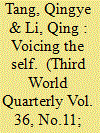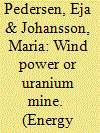|
|
|
Sort Order |
|
|
|
Items / Page
|
|
|
|
|
|
|
| Srl | Item |
| 1 |
ID:
141462


|
|
|
|
|
| Summary/Abstract |
Despite a growing interest in the role of emotions in world politics, the relationship between emotion and securitization remains unclear. This article shows that persistent, if sporadic, references to fear and emotion in securitization studies remain largely untheorized and fall outside conventional linguistic and sociological ontologies. The tendency to discuss emotion but deny it ontological status has left securitization theory incoherent. This article offers a theoretical reconstruction of securitization where emotion, specifically collective fears, serve as the locus of an audience’s judgment for the practice of securitization. Yet rather than simply accepting that fear facilitates securitizing moves, the article draws on appraisal theory from psychology to argue that collective fear appraisals are often fragile cultural constructs. The generation of these emotional appraisals is often constrained by the limited symbolic resources of the local security imaginary and how agents contest and employ these resources. When the capacity to generate collective fears is constrained, so too is the practice of securitization. An empirical discussion of threat images in US foreign policy is used to explore these constraints. The tendency for securitizing moves to be interpreted as comic underscores the precariousness of social practices seeking to elicit particular collective emotions.
|
|
|
|
|
|
|
|
|
|
|
|
|
|
|
|
| 2 |
ID:
141781


|
|
|
|
|
| Summary/Abstract |
Despite a growing interest in the role of emotions in world politics, the relationship between emotion and securitization remains unclear. This article shows that persistent, if sporadic, references to fear and emotion in securitization studies remain largely untheorized and fall outside conventional linguistic and sociological ontologies. The tendency to discuss emotion but deny it ontological status has left securitization theory incoherent. This article offers a theoretical reconstruction of securitization where emotion, specifically collective fears, serve as the locus of an audience’s judgment for the practice of securitization. Yet rather than simply accepting that fear facilitates securitizing moves, the article draws on appraisal theory from psychology to argue that collective fear appraisals are often fragile cultural constructs. The generation of these emotional appraisals is often constrained by the limited symbolic resources of the local security imaginary and how agents contest and employ these resources. When the capacity to generate collective fears is constrained, so too is the practice of securitization. An empirical discussion of threat images in US foreign policy is used to explore these constraints. The tendency for securitizing moves to be interpreted as comic underscores the precariousness of social practices seeking to elicit particular collective emotions.
|
|
|
|
|
|
|
|
|
|
|
|
|
|
|
|
| 3 |
ID:
143561


|
|
|
|
|
| Summary/Abstract |
This study, drawing upon J. R. Martin’s appraisal theory, examines the discursive representations of self in a corpus of in-depth interviews with 15 Chinese old-generation migrant workers. Migrants represent self as aliens, outlanders, the suppressed and socially excluded, but with strong self-awareness and a definite self-categorisation. This study has implications for removing the stigma and stereotype against this group and enhancing their power of discourse. Also, with the voice being heard, the marginalised have the opportunity to resist forced identity and to contribute to building a bridge of sympathy, empathy, respect and understanding between the powerful and the powerless.
|
|
|
|
|
|
|
|
|
|
|
|
|
|
|
|
| 4 |
ID:
112313


|
|
|
|
|
| Publication |
2012.
|
| Summary/Abstract |
This study explores factors associated with the individual's appraisal of anticipated environmental changes caused by energy production facilities. The study took place in a Swedish village where exploratory drilling, that could eventually lead to a uranium mine, was being conducted at the same time as a wind farm was approved. Results from the survey, which included the total population, were interpreted in the light of cognitive stress theory. Most residents thought that the wind farm would have a positive impact on the village but that the uranium drilling would have a negative impact; these opinions were closely related to attitudes towards wind and nuclear power. Perceiving the wind farm as positive was further predicted by young age, high education, being an ordinary rather than a committed recycler and having attended a meeting about the wind farm. A negative view of uranium drilling was predicted by the individual valuing closeness to nature, being a recycler, and having attended the uranium meeting. Psychological factors such as concerns for the environment (manifested as pro-environmental behaviour), valuing closeness to nature, and involvement impinge on the appraisal process and should be considered when new developments are presented.
|
|
|
|
|
|
|
|
|
|
|
|
|
|
|
|
|
|
|
|
|